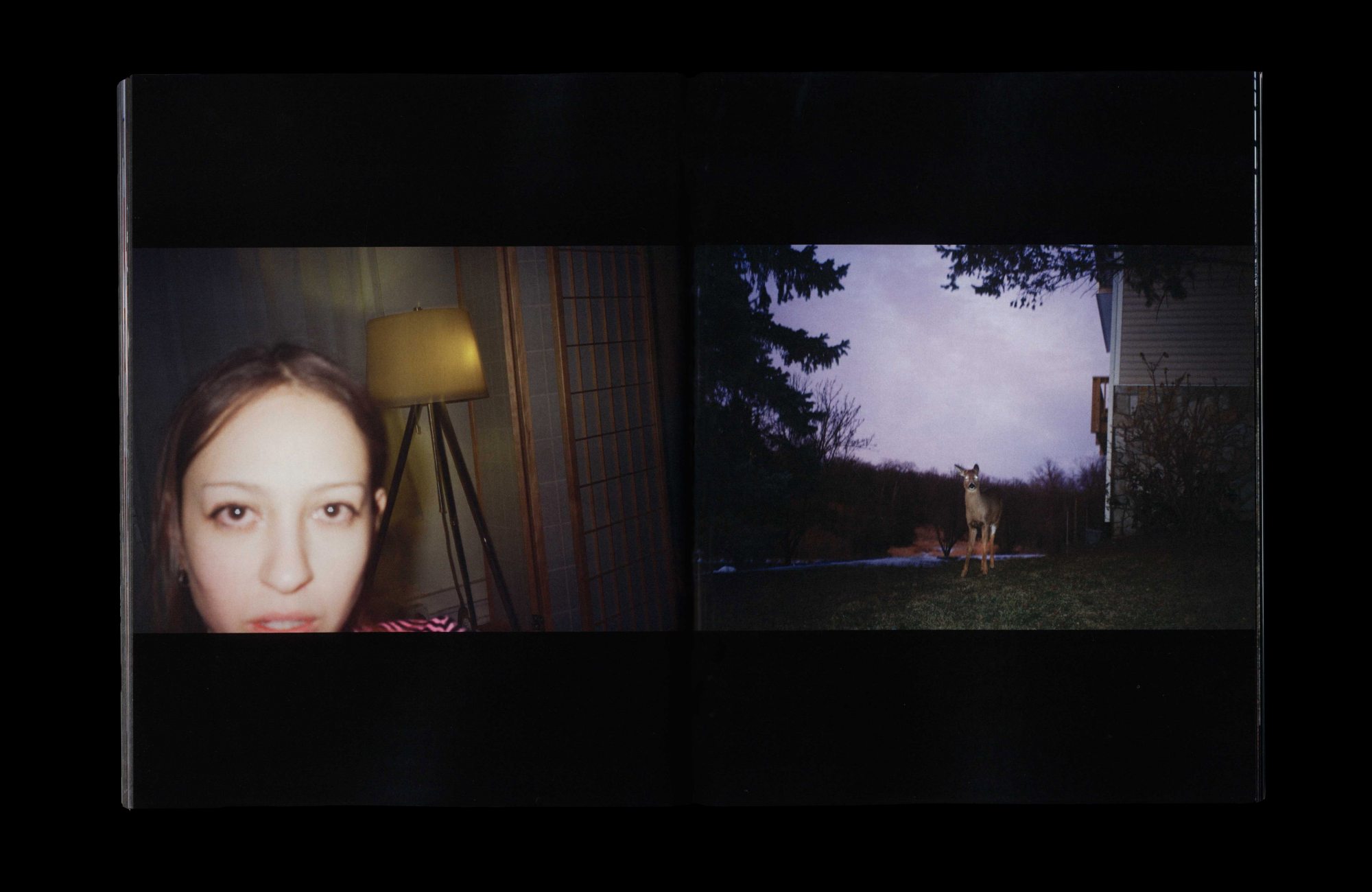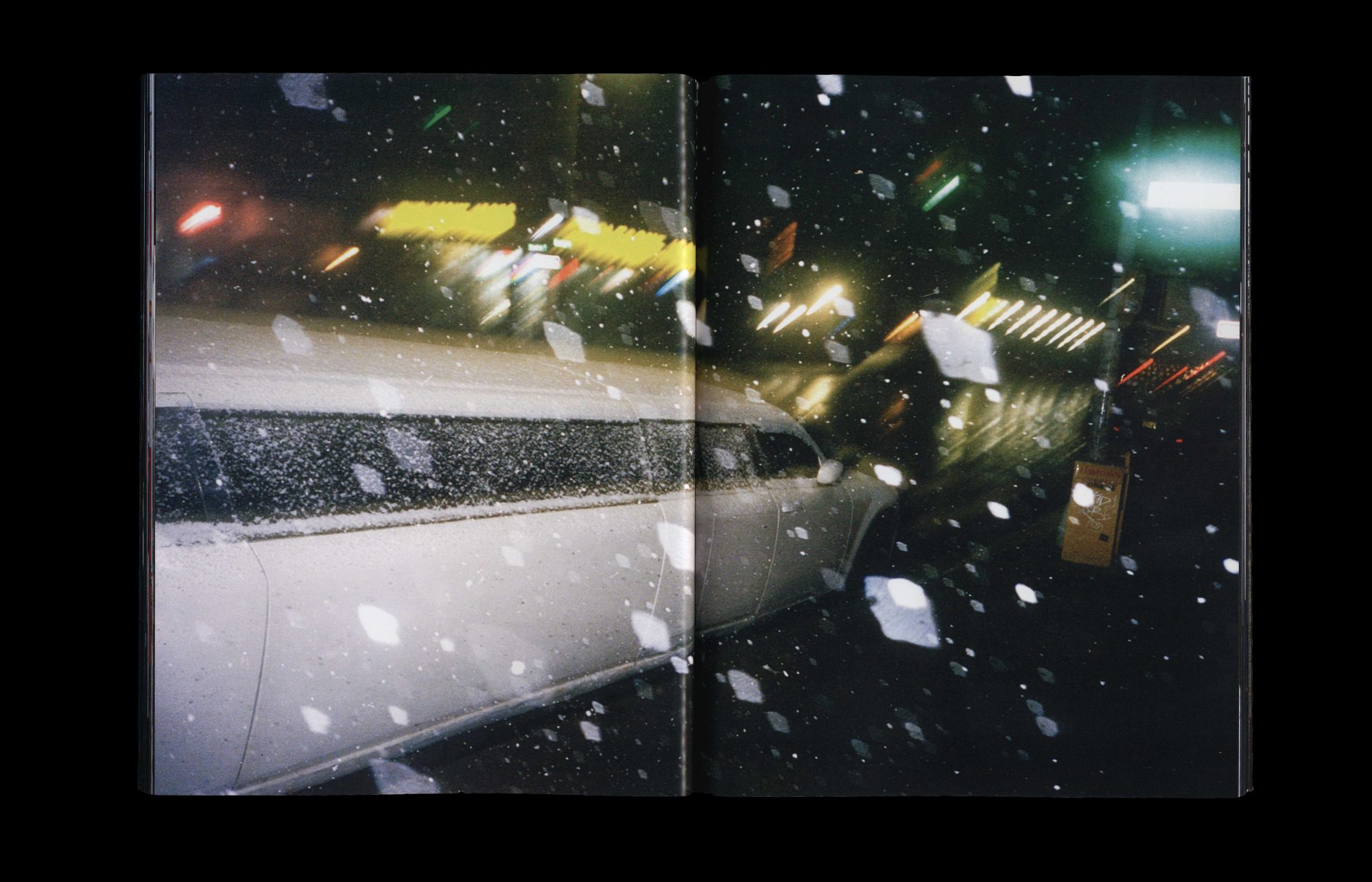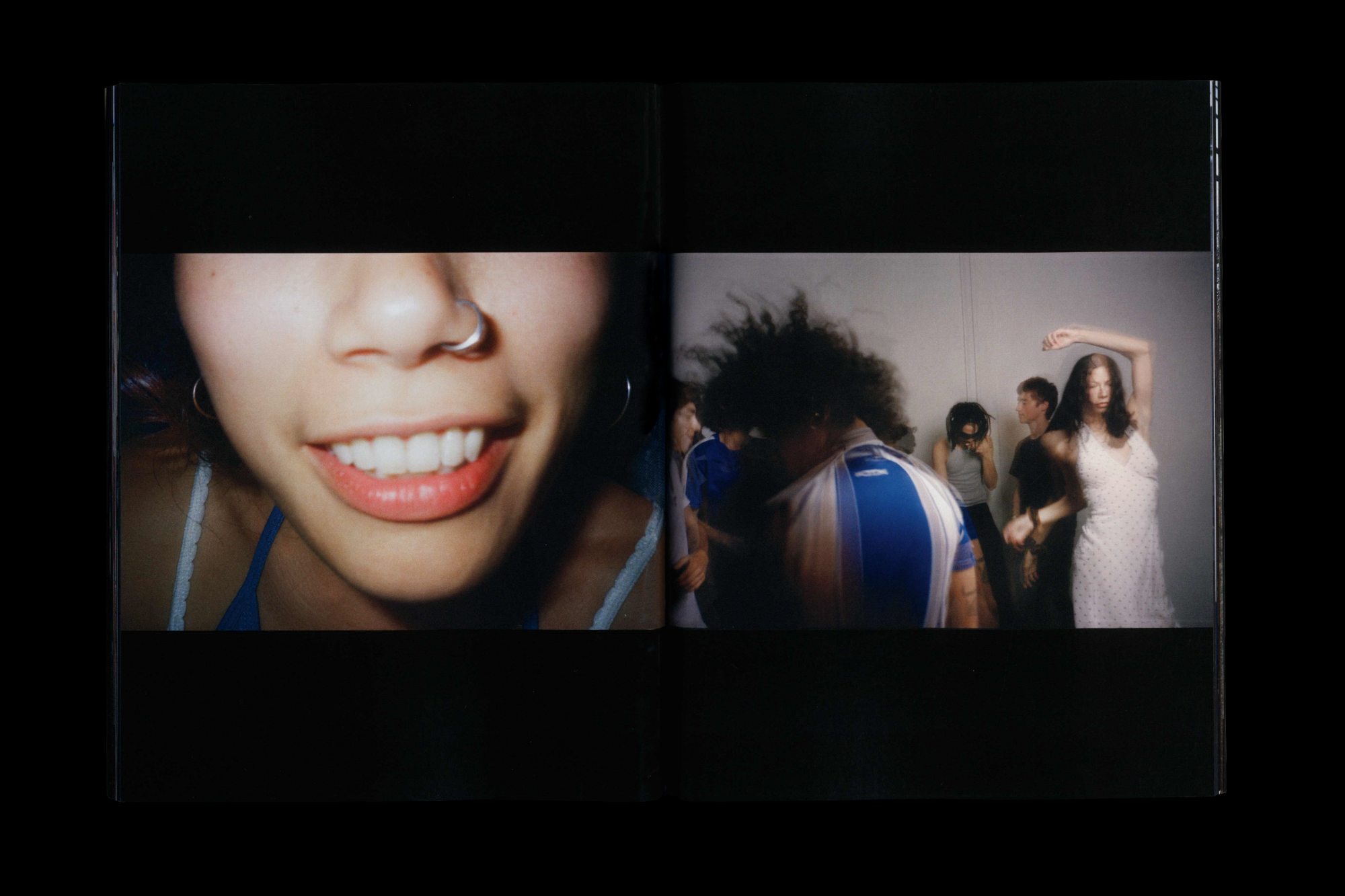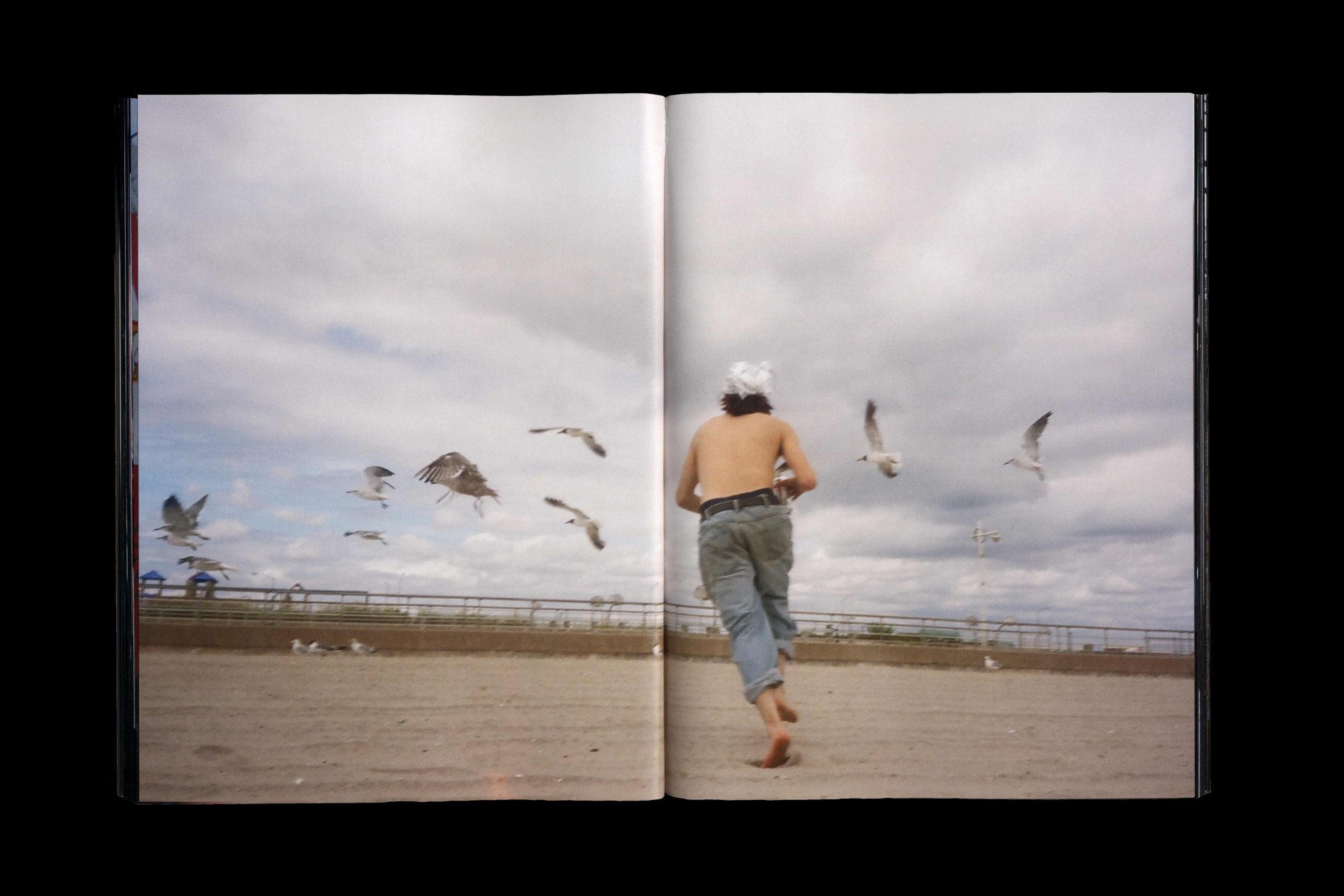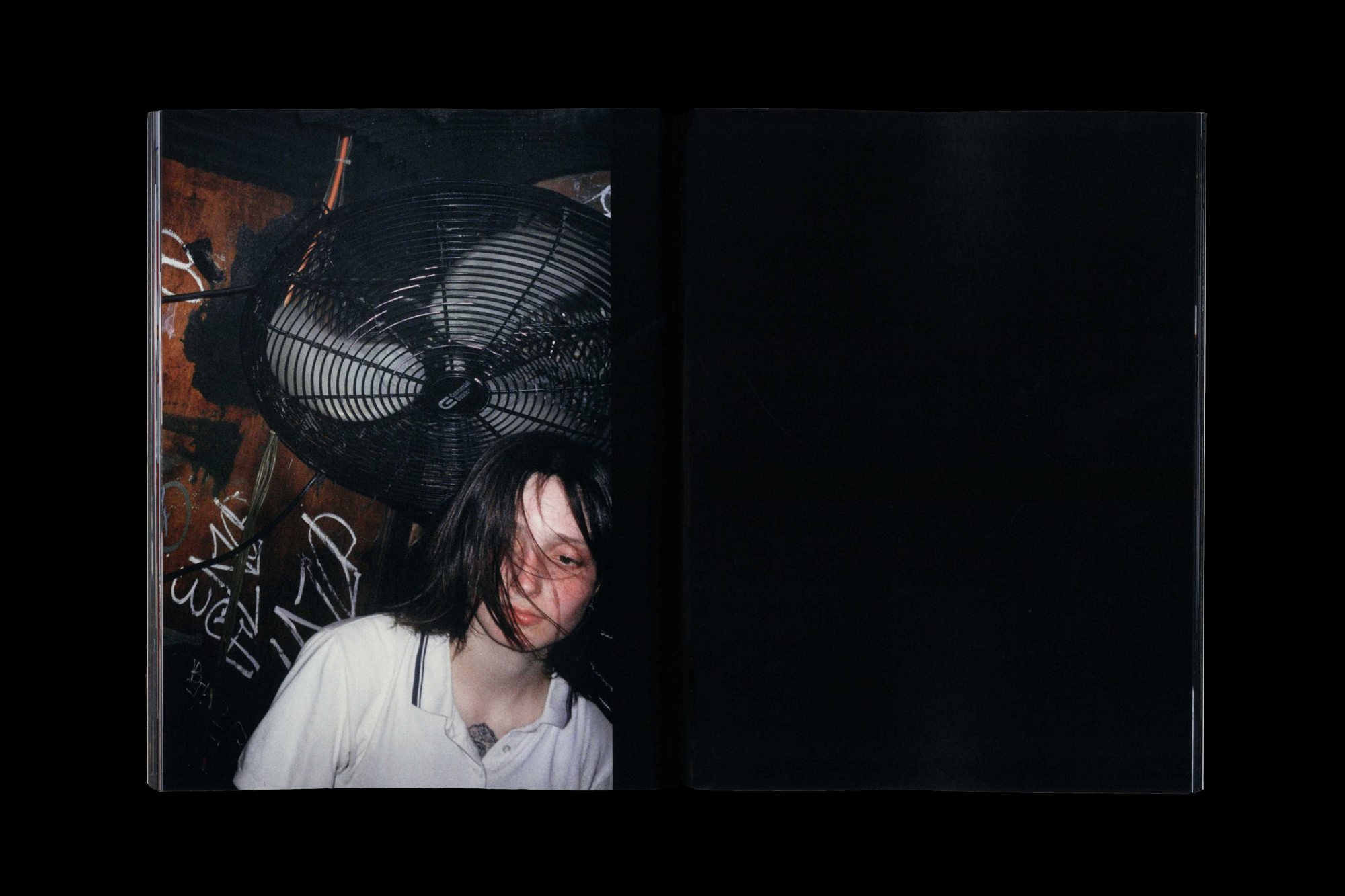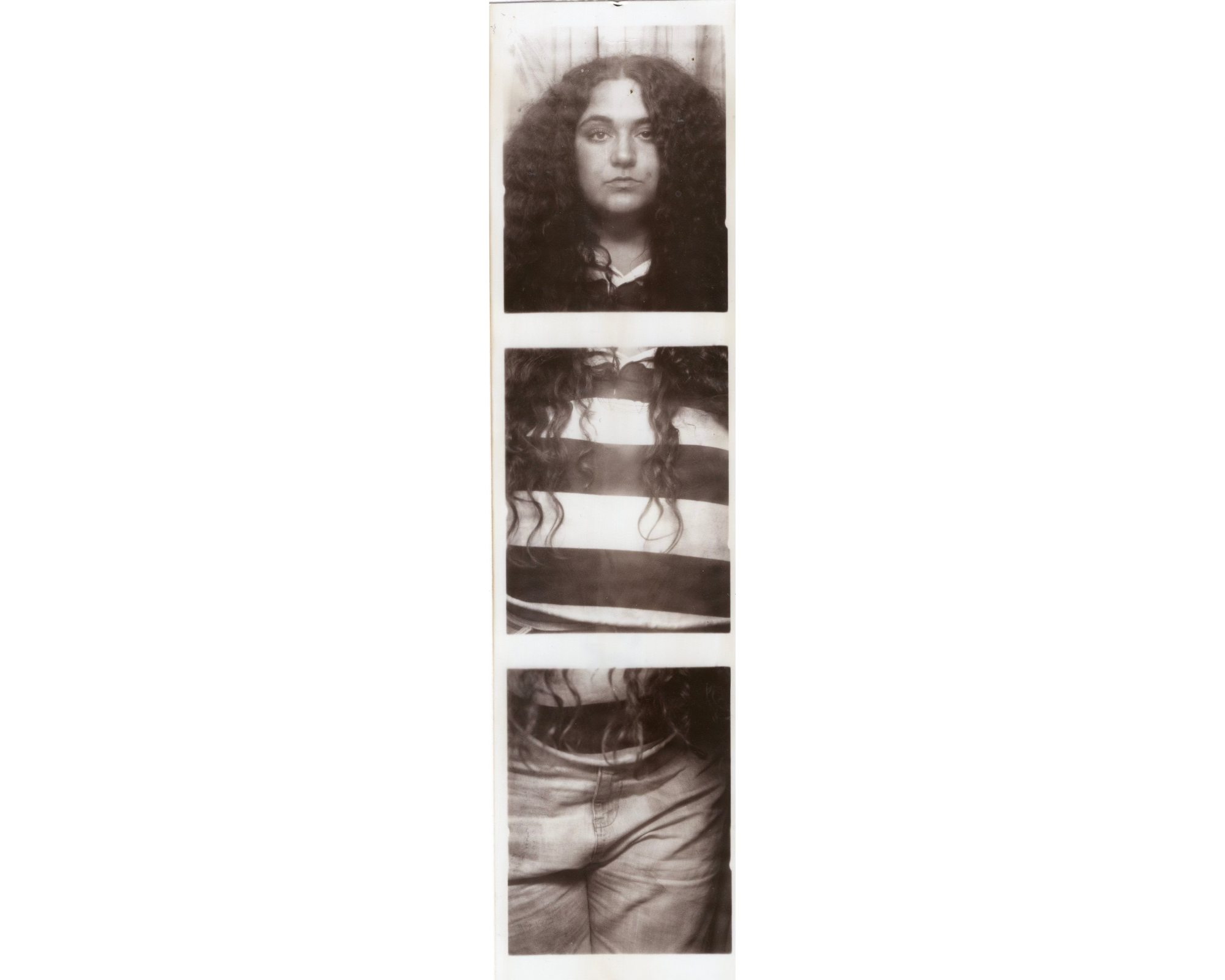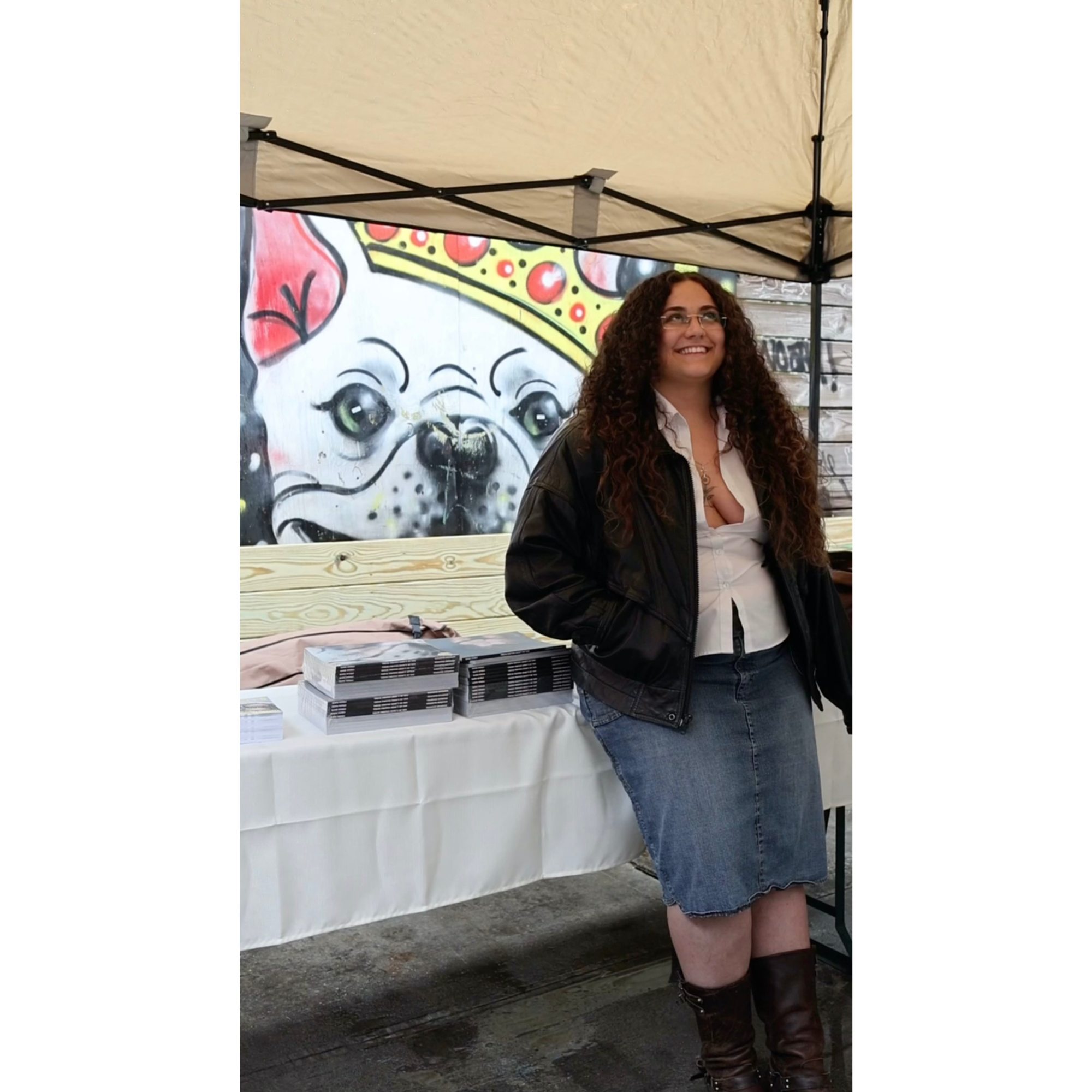“Unposed and Unfiltered: Kate Vitali on Intimacy, Chaos, and Community”
"These Photos Aren't of You" by Kate Vitali
Published by Visigoth Invasion, NY, 2025.
Kate Vitali Interview by James Maher
Maher: Would you mind giving us an introduction?
Vitali: Hi, my name is Kate Vitali. We're at my book launch in Bed-Stuy for my book called These Photos Aren’t of You.
I was born in Brooklyn and moved to New Jersey when I was about two. My mother is an artist. She swears that since I was five years old, I started taking photos. She said that one day she picked up her old chunky digital camera from the early 2000s and she saw a bunch of photos of my twin brother. She knew I had taken them and she was looking at them and was like, ‘Oh my God, some of these are pretty good!’ And she was like, ‘Okay, this is what you're doing now.’ She harnessed my passion and my talent. I went to the ICP Teen Academy when I was 13, I was a teacher's assistant in all of high school for my photo teacher, and then I did a bunch of freelance work when I was a teenager. Then I studied photography at the Pratt Institute.
Maher: Can you tell us about the book?
Vitali: This book is moments throughout the chaos of the night. It’s the in-between moments, finding people caught off guard, not aware of having their photo taken. It’s very day-to-night, like a journey through a night out. It starts more concrete and gets a little more ‘what the fuck’ as it goes. Once you hit the white limo in the snow, things change. Now you’re walking home, you’re tired, you’re recalling your night and thinking about that dead deer you saw. It’s more psychological than I thought it would be.
Maher: How was the party?
Vitali: Oh my God. It was unbelievable. So many fucking people came. I just woke up the next morning and I was saying love was flowing out of my ears 'cause I just felt so supported, loved, and very full of gratitude. I felt very lucky to have this community. It was so, so sweet.
I don't think my work could exist without my community of other creative people. Not only are they photos of the people in the community, but they accept me and let me flourish—take me for who I am. You know, my work is such an extension of myself and my personality. I feel like when I'm being genuine with all these people around, my work is also genuine and intentional. It’s so connected to me and my personality, and everyone seems to be accepting both me and my work really well.
Maher: Do you feel a need to connect with lots of people in your life, in your work?
Vitali: Yeah, I'm a very social person. I'm very extroverted. But also, with networking and trying to make connections with people. It all ends up meshing well together.
Maher: Can you talk more about how you integrate photography into your life? Did you use a small camera for this book? Can you give us a sense of what that was like?
Vitali: I think the work especially in the past five or six years—having gone to Pratt and graduating and navigating through all the social scenes and social spaces—the type of camera that I use and the way that I use it has become so essential. And specifically, the point-and-shoot camera, which has become very trendy these days. I think it is so essential to the way I navigate through the space, having something I can fit in the palm of my hand, and being able to get that shot quickly before somebody notices it. A big part of it is being sneaky. The more posed stuff totally happens, but I think what my editor and I came to realize going through my archive was that the more interesting and emotional photos were the moments between those more posed moments, the more candid. There are a lot of blurry photos in the book. It’s this moment of half-truth; they're not trying to present themselves a certain way or know, ‘Oh, this might go on Kate’s Instagram.’ So yeah, I think having a small camera, being sneaky, having those moments in between the more posed moments, that’s like the main backbone of the book for sure.
Maher: Can you elaborate on the bookmaking process with your editor?
Vitali: Working with my editor, Quin Cunningham, was unbelievable. I've never worked with an editor before. I've never had somebody else look at my work in such a specific and intentional way, like working towards this end goal. I needed and wanted somebody to give an objective point of view to my work because I have such an intense relationship with it. It's very loaded. I wanted somebody removed from my social scene who didn’t know any of my friends. And he ended up fitting perfectly. We met together every week for eight months. He was able to give me the objective opinion that I needed, of just like, ‘This is a good photo, and other people will find it interesting.’ Instead of somebody being like, ‘Oh, this party was so fun,’ or ‘Oh, I love this person, you have to put them in the book.’ He was really, really good at curating what my eye is and what I’m interested in—which I don’t even know sometimes, you know? It’s awesome to have somebody else come in and be like, ‘This is what you’re doing, and this is what you’re interested in.’ And then I’m like, ‘Oh, duh.’ Like, thank you for putting it into words. This was separate from my work at Pratt. My teachers who I love so much, my professors, and my classmates, nobody ever gave me a critique on this work, which is why it was so important to have somebody like Quin come in.
We proofed it literally 10 times. I thought that the first proof we made, I was like, ‘Oh, we’re one away.’ And then every time we got a new proof it was like, ‘This needs to change.’ So much changed. If you looked at the first proof to now, they look so, so different. And I was still making work while we were putting the book together. The most recent photo is from December or January when we were halfway through making the book.
Maher: Can you talk about the experience of making such revealing and intimate work, of both yourself and your friends?
Vitali: With the work that's in the book, I have spent so long doing it that it gets to a point where it just feels like second nature. I’m not really thinking about it anymore—like how personal it may or may not be, or vulnerable, or any of that. It sort of is just like, I can’t not do it. Like, I have to do it. I really want to do it, which ends up feeling like I have to, in a good way.
The work I was making in school was extremely personal and extremely vulnerable. Like literally, being like naked as fuck in the Pratt gallery, in the photos. I was already aware of how it felt. You just get to a point where you’re like, ‘Fuck it.’ And I try not to take it or anything too seriously. With my community, I think everybody sort of knows what I’m doing now and that it might go on my Instagram or it might go somewhere. You know, with the more explicit photos, I tell them that I’ll save it for like my MoMA retrospective in 50 years—you know, when we’re all way older and are like, ‘Awwww, we were so young and stupid and whatever.’ Everyone has just sort of come to terms with like, if you’re around me, you’re at risk. You are subject to my eye and my gaze and my camera.
If you’re kissing around me, if you’re peeing on the street around me, if you’re doing something that falls into the subgenres of my work—they probably have a good idea that they’ll see a flash soon. Everybody should be signing a contract when they become my friend that I might take photos of you in your vulnerable moments. But you’ll be happy that I did, like 20 years from now. Which is also why I do all of this. That comes with the territory of photography—you know, time, memory, all that bullshit. It’s all very wholesome. For now, but also for later.
Maher: Even though these may be not traditionally flattering moments, they still feel flattering to me in a way, like there’s a kind eye behind the camera.
Vitali: Thank you. I hope so. Whenever I am taking these people’s pictures, it is so out of love and joy, which is such a classic cliché, you know? It’s like love and community and love for my people and this generation of creatives around me. And how I felt after the book launch, love is literally flowing out of all parts of me.
Maher: Can you talk about Instagram and social media? On one hand, it’s a life a lifeline… the lifeline. But at the same time, there's so much conflict behind the app and issues that it can cause, such as self-image. Do you mind just spit balling about that?
Vitali: I was thinking about our previous conversation when you asked if the kids were all right and I was like, ‘The kids are all right—it’s just the phones really fucked us.’ And it’s true. Instagram, especially for creative people and myself included, is so important for building that community that we were talking about and getting jobs even. I sold out of all my books this past week and I would about 75% of that was Instagram. And that’s how I built this whole persona, this ‘Kate Shoots Film’ persona—it was totally 100% through Instagram.The dark-sided underbelly of Instagram is so terrible and grim and just so bad for my brain. If I wasn’t doing what I do, if I wasn’t in this creative field, I would like to not have Instagram. The shit that we’re fed and have been fed since we were so little is so damaging. You have to catch yourself when you find yourself in that spiral. It’s such a double-edged sword because there’s so much good stuff on there and good art, great art, great people. I’ve made so many connections and seen so many things that have contributed to myself and my practice. But yeah, the evil dark side is so, so real and we’re all feeling it. This is something that me and my friends talk about all the time and we’re always like, ‘We’re gonna get flip phones and not have social media and just call each other and hang out at the park,’ And like, in a perfect world, yes—but I also need to pay my rent and get these jobs.
Like just before this somebody DM’d me on Instagram asking if I can do a freelance, and I think that’s how a lot of my other creative friends get their work sold or anything like that. It’s very good, but it’s very terrible.
And being a woman on Instagram is a whole other can of worms. Being a woman artist on Instagram is so hard. And in person, I’ve had some dudes come up to me and sort of talk down to me about my Instagram and my photographic practice in a way that feels off—and these are other art dudes, our age. They’re like, ‘Oh, your little Instagram, your little point-and-shoot camera, you’re trendy…’ you know? ‘All the girls have their film camera and their little digital cameras,’ suggesting that maybe what I’m doing is not original or whatever. But it’s like… I don’t really give a fuck. Or I try not to. The implications are extremely weird and nuanced. Something that is being more understood every day. And Instagram started as an app for photographers to share their work. I’m going back to the roots, you know?
Maher: Can you tell us about your time at Pratt?
Vitali: Pratt was the best. I rave about it to this day. Whenever somebody asks how my time was at Pratt, I just rave about it. The faculty there is amazing—the photo faculty specifically is amazing. I still keep in touch with my professors.
I started Pratt in 2019. My freshman year was right before COVID. We had a normal fall semester of foundation year, then we started our spring semester and we got sent home for what we thought was two weeks. I ended up having to do a hybrid sophomore year—which, like, art school and being online does not make any sense whatsoever.
We were mainly online about two-thirds of the time, and then the other third we were going in masked up and with maybe six or seven other people in the class. Which was weird, but I don’t even think about it as much anymore because my junior and senior years were so incredible. I learned so much; it was so fulfilling. Going to a true art school—not one inside a bigger school like Tisch or Parsons—you just get an experience that you can’t get anywhere else. Being surrounded by all creative people, people trying to do the same thing or interested in the same stuff as you, is so important. It makes you feel like, ‘Oh, I’m not crazy.’
There are people who understand me, adults who understand me and my practice. All the friends I made there are still my best friends. My professors too. It’s all love. I love that school so much, I love being in school, I love being in a classroom—it’s worth being $200,000 in debt. Everyone asks me, ‘Is it worth it?’ I wouldn’t trade it for the world.
Maher: I like that you used the word ‘crazy’ because I’m guessing in the walls of Pratt, crazy is a good thing. Outside, they use it differently.
Vitali: Yeah, especially if you saw my project Richard—he looks fucking crazy. Richard was a seven-foot soft sculpture of a man that I made. Very absurd, absurdist, satirical figure for my thoughts and considerations on sexuality, gender, and the patriarchy. Just like being a woman, and all that comes with it. I lived with him for two years and brought him around, made a bunch of films, and took self-portraits with him. He was a very big part of my life. The shit I was doing with Richard my senior year was balls-to-the-wall insane. The crazier it got, the more people fucked with it. People were like, ‘She does not give a fuck. She is doing what comes to her.’ And that’s what brought people in. Richard was an icon at school. People would be like, ‘Where’s Richard? Kate and Richard. I’ve seen you before, with that doll.’ All because I said, ‘Fuck it, I’m going to walk around with this seven-foot sculpture for two years.’ And people ate it up. They loved it.
Maher: Where do you want your career to go?
Vitali: Right now, I’m very much involved in trying to get my name out there. Essentially what I do is more documentary. The dream is for people to say, ‘I want Kate Vitali to shoot this. I want her eye on it.’ I’m also trying to be more intentional with how I light things, just to have more time to think about what I’m doing. I’m not going to be 23 forever, hanging out with the same people. I want my practice to grow with me, stay consistent with my eye, and evolve with the places I’m in and the people I’m around.
Kate Vitali (b. 2001) is a photographer working in New York. Vitali was born in Brooklyn and grew up in Maplewood, New Jersey where she began taking photographs at the age of four. Vitali graduated from Pratt Institute in 2023 with a BA in Photography and concentration in film and video. She shoots frequently, often at the request of her friends, and is drawn to their dirty, frayed edges rather than the smiles they put on for the camera.
Vitali’s non-photographic practice includes Richard (2021-2023), a long-term multimedia project bridging soft-sculpture, film, and photography, centered on a larger-than-life, anatomically correct male doll named Richard who acted as a satirical avatar for Vitali’s consideration of power, sexuality, and the absurd.
Vitali’s work has been featured in Interview Magazine and Office Magazine and she has directed music videos. Her work has been exhibited in New York and Los Angeles.
@katevitalii
https://katevitali.com/
「飾らない視線で──ケイト・ヴィターリが語る親密さ、混沌、そしてコミュニティ」
ケイト・ヴィターリ インタビュー
『These Photos Aren’t of You』ケイト・ヴィターリ著
ヴィジゴス・インヴェイジョン刊(ニューヨーク)2025年
インタビュー:ジェームス・マハー
翻訳:須々田美和
マハー:自己紹介をお願いできますか?
ヴィターリ:こんにちは、ケイト・ヴィターリです。今日はブルックリンのベッドスタイで開催中の、私の写真集『These Photos Aren’t of You』の出版記念イベントにいます。私はブルックリンで生まれて、2歳の頃にニュージャージーに引っ越しました。母はアーティストで、私が5歳の頃から写真を撮り始めたって言い張ってます。ある日、彼女が2000年代初頭のゴツいデジカメを手に取ったら、私の双子の兄の写真がたくさん入っていて、「あっ、これケイトが撮ったんだ」と気づいたそうなんです。それで「うわ、これけっこういいじゃん!」ってなって、「じゃあ、あなたはこれをやっていくのね」って感じで(笑)。母は私の情熱と才能を見出してくれて、13歳でICPティーンアカデミーに通わせてくれました。高校ではずっと写真の先生のアシスタントをしていて、10代の頃にはフリーでもいろんな仕事をしていました。それからプラット・インスティテュートで写真を学びました。
マハー:写真集について教えてください。
ヴィターリ:この本は、夜のカオスの中の瞬間を切り取ったものです。いわゆる“隙間の瞬間”っていうか、不意を突かれて撮られた、本人も写真を撮られていることに気づいてないようなタイミングです。日中から夜へと移り変わるような構成で、まるで一晩の冒険みたいな流れになっています。最初はもう少し現実的で、だんだんと「なにこれ?」っていう感じに変化していくんです。雪の中に白いリムジンが出てくるあたりで空気が変わって、そこからは帰り道を歩いている感じ。疲れていて、夜のことを思い返して、死んだ鹿のことを考えたりして。思っていたよりもずっと心理的な旅になりました。
マハー:出版イベントはどうでしたか?
ヴィターリ:もう、信じられないくらい素晴らしかったです。ありえないくらいたくさんの人が来てくれて。次の日の朝目が覚めたとき、「愛が耳から溢れてる」って感じたくらい。とにかく、支えられてる、愛されてるってすごく感じて、感謝の気持ちでいっぱいでした。こんなコミュニティに囲まれているなんて、ほんとに幸運だと思います。私の作品は、周りのクリエイティブな人たちがいなければ成立しなかったと思う。写真に写っているのはコミュニティの仲間たちであり、同時に私を受け入れてくれて、私らしくいさせてくれる存在。私の作品って、自分自身や性格の延長なんですよね。だから、周りに正直にいられるとき、自分の作品も誠実で意図のあるものになる。私のパーソナリティと作品はすごく結びついていて、周りの人たちもその両方をちゃんと受け入れてくれてるのが伝わってきます。
マハー:人生や作品の中で、多くの人とのつながりを持つことは重要だと思いますか?
ヴィターリ:うん、私はかなり社交的で、すごく外向的な人間です。人とつながるのも好きだし、ネットワークを作ることも含めて、そういうのがすべて自然に結びついてる感じです。
マハー:写真が生活の中でどう機能しているか、もう少し教えてくれますか?この本は小さなカメラで撮ったんですよね?その感覚についても聞きたいです。
ヴィターリ:特にここ5、6年のあいだ、プラットを卒業していろんなソーシャルな空間に出入りするようになってから、使うカメラの種類とその扱い方がすごく大事になってきたんです。今流行ってるコンパクトな“ポイント・アンド・シュート”カメラ、それが自分の動き方にすごく合っていて。手のひらに収まって、誰かが気づく前にパッと撮れる。その“気づかれないこと”がすごく重要なんですよね。もちろん、ポーズした写真も撮るけど、編集者とアーカイブを見返して気づいたのは、より感情的で面白い写真って、そういうポーズの合間の自然な瞬間なんです。だから、この本にはブレた写真もたくさん入ってます。いわば“半分だけ本当”みたいな瞬間。その人が「インスタに載るかも」って思ってポーズしてるわけじゃない状態で、ふとした一瞬を捉えたもの。それがこの本の土台になっています。
マハー:編集者との本作りについて、もう少し詳しく教えてください。
ヴィターリ:ヴィターリ:編集者のクイン・カニンガムとの作業は、本当に信じられないくらい素晴らしかったです。編集者とちゃんと一緒に仕事をするのは今回が初めてだったし、ここまで具体的で意図的に、最終的な完成形に向けて誰かに作品を見てもらったこともこれまでありませんでした。私は自分の作品にすごく強い思い入れがあるから、どうしても主観的になってしまう。だからこそ、客観的に見てくれる誰かが必要だったし、そういう人に見てほしかった。しかも、自分の友人関係やソーシャルな文脈とは無関係な人であってほしかった。クインはまさにその理想にぴったりの存在でした。私たちは毎週会って、8ヶ月間ずっと一緒に作業を続けました。彼は私が本当に必要としていた“客観的な意見”をくれる存在で、「これはいい写真だよ。他の人もきっと面白いと思うはず」って、すごくシンプルに伝えてくれた。「このパーティ楽しかったよね」とか「この人好きだから絶対入れたほうがいいよ」とか、そういう感情ベースの判断じゃなくて、本当に純粋にビジュアルとしての価値を見極めてくれるんです。彼は私の「視線」や「関心ごと」をとても上手に編集してくれて、それは時に自分でも気づいていなかったことだったんです。「あなたが本当にやってることってこれでしょ?あなたが惹かれてるのはここだよ」って言語化してくれる存在がいるのって、ほんとにありがたいこと。この本の制作は、プラットでの課題とは完全に別物でした。私がすごく愛しているプラットの先生たちやクラスメートたちでさえ、この作品については誰も批評してこなかった。だからこそ、クインのような人が入ってくれることがとても重要だったんです。校正も、本当に10回以上やりました。最初の校正が終わったときは「もうあと一歩だね」って思ってたけど、新しい校正が届くたびに「ここも変えよう」ってなって、結果的に本当にいろんなところが変わりました。最初の校正と最終的な本を見比べたら、まるで別物のように見えると思います。しかもその間もずっと撮影は続けていて、いちばん最近に撮った写真は12月か1月。つまり、本の制作がちょうど半分くらい進んだあたりのタイミングでした。
マハー:こんなに親密で、自分や友達をさらけ出すような作品を作ることへの思いは?
ヴィターリ:この本に入っている作品は、長い時間をかけて撮ってきたものだから、もうほとんど「呼吸するようなもの」になってて。どれくらいパーソナルかとか、脆さがあるかとか、そういうことを意識することもなくなってきてます。というか、やらないっていう選択肢がないんです。やりたくてしょうがなくて、それが「やらなきゃ」に自然と変わってる、良い意味で。学生時代に作っていた作品は、すごくパーソナルで、すごく脆いものでした。もうほんとに、プラットのギャラリーで“ガチで全裸”の自分を展示してたくらい(笑)。それがどんなふうに感じられるか、当時から自覚はしてました。でもあるとき、もう「もういいや、やっちゃえ」って思える瞬間が来るんですよね。で、今では周りの人たちも、私がどういうことしてるのか分かってくれてて、「その写真、たぶんインスタに載るかもね」とか思ってくれてる。ちょっと露骨な写真に関しては、「これは50年後にMoMAでやる回顧展用にとっておくから」って伝えてます(笑)。その頃にはみんな歳をとって、「あの頃ってバカだったよね〜」って笑えるようになってるはず。みんなある意味、「私の周りにいるってことは、私の目や視線やカメラの対象になる可能性がある」ってことを受け入れてくれてるんです。もし私のそばでキスしてたらとか、路上でおしっこしてたらとか、何か私の作品のジャンルに引っかかるようなことをしてたら——もうすぐフラッシュが光るって思ったほうがいい(笑)。正直、私と友達になるなら、「あなたの一番無防備な瞬間を撮られるかも」っていう契約書にサインしてもらいたいくらい。でも、きっと20年後には「撮ってもらえてよかった」って思ってもらえると思うんです。それが私がこれを続けてる理由のひとつでもあって。写真ってそういうものでしょ——時間、記憶、そのへんの全部。馬鹿げてるけど、すごく健全で愛おしい行為だと思ってます。今この瞬間のためでもあるし、未来のためでもあるんです。
マハー:たとえ美しい瞬間じゃなくても、優しさがあるように感じます。
ヴィターリ:ありがとう。そう思ってもらえたらすごく嬉しいです。私はいつも、愛や喜びから写真を撮っていて、それってもう超クラシックな答え方だけど、ほんとにそうで。自分のまわりの人たちへの愛、この世代のクリエイティブな仲間たちへのリスペクト、そういう気持ちが全部に詰まってる。出版イベントのあとも、ほんとに全身から愛が溢れてるって感じてました。
マハー:インスタグラムやSNSについてはどう思いますか? すごく大事なライフラインでもありつつ、問題点も多いですよね。
ヴィターリ:前に「今の子たちって大丈夫かな?」って聞かれたとき、「子どもたちは大丈夫。でも、スマホが私たちをぶっ壊したんだよね」って答えたんだけど、ほんとその通りだと思う。
インスタって、クリエイティブな人たちにとって、コミュニティを築いたり、仕事を得たりする上でめちゃくちゃ大事。私がこの前本を完売できたのも、たぶん75%はインスタのおかげ。「kate shoots film」っていう自分のパーソナみたいなのも、完全にインスタから生まれたんです。でも、インスタの“裏の顔”ってマジでやばい。すごく陰鬱で、精神的にもめっちゃ悪影響ある。もし私が今の仕事をしてなかったら、インスタなんてやってなかったと思う。だって、私たちがずっと見せられてきたあの情報、ほんとに有害だもん。だから、自分で気づいて「今ヤバいな」って思ったときに、ちょっと引くようにしてます。いいアートやいい人に出会える場所ではあるけど、その分闇も深い。友達ともよく話すんだけど、「もう flip phone に戻って、公園で会って、電話だけで連絡取る生活にしようよ」って(笑)。理想だけど、現実は家賃払わなきゃいけないし、仕事も取らなきゃいけない。さっきもインスタのDMで仕事の依頼が来たし、周りの友達もだいたいそんな感じで仕事が回ってる。だから良くも悪くも、切り離せない存在なんだよね。
あと、女性としてインスタにいることの難しさもあるし、女性アーティストってだけでも大変。同年代の男性アーティストが私に対して「お前のインスタってさ、小さいカメラで流行りに乗ってる感じだよね」みたいな、ちょっと見下したようなこと言ってきたこともあるし。そういうのってほんとムカつく。でも、もう気にしないようにしてる。ていうか、気にしてたらやってられない(笑)。インスタって、元々は写真をシェアするためのアプリだったんだし、私はそこに立ち返ってるだけ。
マハー:プラットでの時間についても教えてください。
ヴィターリ:プラットは、ほんと最高だった。今でも誰かに「どうだった?」って聞かれたら、全力でオススメしてます。特に写真学科の先生たちはほんとに素晴らしくて、今でも連絡取ってる教授もたくさんいます。私は2019年に入学して、1年目の秋は普通に過ごしてたんだけど、春に入ってすぐ「2週間だけ家に帰って」って言われて、それがそのままパンデミックでオンラインに。アートスクールでオンラインって、ほんと意味わかんない(笑)。2年生のときはハイブリッドで、授業の3分の2はオンライン、残りは少人数でマスクして登校。でもあんまり覚えてないくらい、3〜4年生が最高すぎたんです。めっちゃ学びがあったし、充実してた。本格的なアートスクールって、TischやParsonsみたいな大学内の学科とは違って、空気が全然違うんですよね。まわりにいるのはみんな本気で何か作ろうとしてる人たちばかりで、「あ、自分だけじゃない」って思わせてくれる場所だった。自分を理解してくれる大人もいて、安心できる空間でした。そこでできた友達は今でも一番大事な人たちだし、先生もそう。とにかく愛しかない学校。教室にいるのが大好きだったし、2000万円の借金抱えてでも通ってよかったって思えるくらい(笑)。誰に「それって価値あった?」って聞かれても、「絶対にあった」って言える。
マハー:「クレイジー」って言葉を使ってたけど、プラットの中ではそれっていい意味ですよね?
ヴィターリ:うん、ほんとにそう。特に私のプロジェクト「リチャード」を見たら「こいつヤバいな」ってなると思う(笑)。リチャードって、2メートル以上ある男性のソフトスカルプチャーで、性とかジェンダー、家父長制に対する自分の考えを反映させたキャラなんです。2年間一緒に暮らして、一緒に映像作ったり、自分とのセルフポートレートを撮ったりもしました。めちゃくちゃだったけど、どんどんウケがよくなって、「この子、マジでやりたいことやってるな」って感じで注目されるようになっていって。「ケイトとリチャードの子でしょ?」って言われるくらい、学校ではちょっとしたアイコンみたいになってました。
マハー:これからのキャリアについて、どう考えていますか?
ヴィターリ:今はとにかく自分の名前をもっと広めたいと思ってます。やっていることはドキュメンタリー的な要素が強くて、「この企画はケイト・ヴィターリに撮ってほしい」って言ってもらえるようになりたい。あと、ライティングにももっと意識的になって、自分のやってることをちゃんと考える時間を持ちたいなって。ずっと23歳じゃいられないし、いつまでも同じ仲間と同じ空間にいるわけじゃないから。でも、自分の「まなざし」は変えずに、それを軸にして、いる場所や関わる人たちと一緒に進化していきたいと思ってます。
ケイト・ヴィターリ(2001年生まれ)は、ニューヨークを拠点に活動する写真家です。ブルックリンで生まれ、ニュージャージー州メープルウッドで育ち、4歳の頃から写真を撮り始めました。2023年にプラット・インスティテュートで写真を専攻し、映画と映像制作を副専攻として卒業しています。日常的に撮影を行っており、友人たちのリクエストでカメラを向けることもしばしば。ヴィターリが惹かれるのは、被写体がカメラに向かって作る笑顔ではなく、その人がふと見せる“擦り切れた輪郭”のような、生々しい一瞬です。写真以外にも、「リチャード」(2021〜2023)という長期プロジェクトに取り組んでいます。これはソフトスカルプチャー、映像、写真を横断するマルチメディア作品で、解剖学的に精密な実物大の男性人形“リチャード”を主人公に、権力、セクシュアリティ、不条理といったテーマを風刺的に掘り下げたものです。『Interview Magazine』や『Office Magazine』で紹介され、ミュージックビデオの監督としても活動しています。これまでにニューヨークやロサンゼルスで作品を発表しています。
